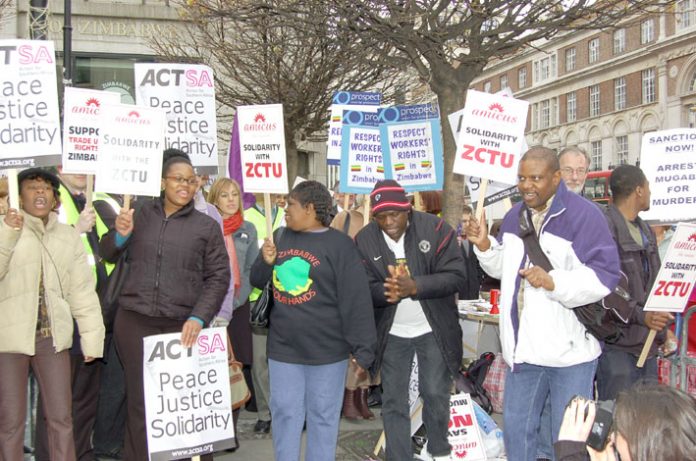
In Zimbabwe the police still torture while a political solution to the country’s crisis is being sought, says Amnesty International.
The Zimbabwean government continues to beat and torture political opponents and human rights defenders, despite the ongoing mediation process being facilitated by the Southern Africa Development Community (SADC), the human rights organisation said.
A team from Amnesty International, just returned from a mission to Zimbabwe identified specific police units responsible for most of the human rights abuses being carried out.
Simeon Mawanza, Amnesty International’s researcher on Zimbabwe said: ‘Organised police violence and torture has continued during the SADC mediation – in fact, the severity of beatings and torture has been increasing.
‘We have collected evidence from a wide range of sources, including victims, doctors and lawyers, showing how some units – particularly the Law and Order Section – within the Zimbabwean police enjoy total impunity for human rights violations perpetrated against government critics.’
Amnesty International found that the Zimbabwean police continue to use excessive force and torture to suppress freedom of association and assembly by human rights defenders and by members of the Movement for Democratic Change (MDC).
Simeon Mawanza said: ‘Police stop small demonstrations by just scores of human rights defenders.
‘Once in police custody, human rights defenders and MDC members are severely assaulted and denied access to lawyers, food and medical care.’
On November 22, at least 22 members from the non-governmental organisation the National Constitutional Assembly (NCA) were rounded up by unidentified people and bundled into two minibuses in Harare’s central business district area.
They were reportedly taken to the ruling ZANU-PF’s Harare province offices where they were beaten on the soles of their feet with sticks and iron bars.
‘They were later ordered to clean the floor of the room and a toilet with their bare hands.
‘The perpetrators allegedly called the police and the victims were taken to Harare Central police station, where police charged them with “obstruction” and they were made to pay fines.
None of the perpetrators was arrested.
Ten of the victims were later hospitalised.
On July 25, at least 200 activists from the NCA were arrested by police in Harare after participating in a peaceful march.
‘The activists were taken to Harare Central police station, where many were severely assaulted by police and unidentified people in plain clothes for about six hours.
‘They were then released without charge.
‘At least 32 of the activists were later hospitalised – 14 had fractured limbs. Among the injured was a 19-month-old baby, who had been assaulted by police with a baton stick.
‘The current SADC mediation process must prioritise human rights concerns,’ said Mawanza.
He added: ‘SADC leaders should demand that the government takes immediate steps to ensure respect for human rights by the Zimbabwean police, including in particular the Law and Order Section.
‘There must be no impunity for those responsible for human rights violations.’
The human rights violations in Zimbabwe are taking place against a background of a fast shrinking economy.
At the end of October, inflation was officially at 14,000 per cent.
Most basic goods – including maize, the staple diet – are in short supply.
The prices of basic goods is beyond the reach of ordinary households.
Most families cannot afford food, education and health care.
The World Food Programme estimates that four million Zimbabweans are in need of food aid.
The current mediation process being facilitated by the Southern Africa Development Community (SADC) is the only international process trying to break the political impasse in Zimbabwe.
l Meanwhile, Amnesty International has described Pakistan’s decision to lift the State of Emergency tomorrow as inadequate and ‘fundamentally flawed’.
President Musharraf’s decision to lift state of emergency fails to deal with a weakened judiciary and leaves country open to human rights violations, Amnesty said.
Kate Allen, Director of Amnesty International UK, explained: ‘The lifting of the measures imposed by President Musharraf are insufficient and leave the country’s constitution fundamentally flawed.
‘It does nothing to address the serious concerns we have – human rights violations will continue to go unchecked.
‘Key changes made under the Provisional Constitutional Order (PCO) during the State of Emergency will become permanent, including the removal of key independent judges who have pursued a human rights agenda.
‘The power of the Supreme Court will remain severely weakened, denying it any judicial review over President Musharraf’s orders or his Government’s actions during the emergency.
‘Amnesty International is demanding that the superior court judges removed from service under the PCO are reinstated and an independent judiciary is allowed to fulfil its critical role in the protection of human rights and the rule of law.’